May 13 2011
Rory Days: An interview with Robin Sylvester — Part 2
Robin Sylvester, bass player for Bob Weir’s Rat Dog, has been a fixture of the San Francisco music scene for so many years that one might understandably forget his substantial musical accomplishments in his own native England. In the late sixties, as the British Blues explosion rocked the pubs, clubs and concert halls of London Town, Robin was one of those lucky sods who witnessed it all, and much like his American counterparts who descended upon Yasgur’s farm in the summer of ’69, he can legitimately point to those heady times and say, “Yes, I was there!”
Born in 1950 Post War London, Robin spent much of his youth singing with the London Boy Singers, a professional boys’ choir patronized by distinguished composer Benjamin Britten. The choir performed regularly at Covent Gardens, and even made an album of Christmas music at famed Abbey Road Studios. Although now primarily known as a bass player, Robin also plays keyboard and guitar. By the time he turned 15 he was playing double bass in a Jazz band called, the David Lund Trio, and then later, the folk-rock band ORA. In 1969 he started working as chief engineer at London’s Tangerine Studios, and for the next 5 years worked closely with some of the finest up and coming Jazz, Progressive Rock, and Blues bands of Great Britain — none finer, at least in this writer’s view, than Ireland’s favorite son, Rory Gallagher.
Recently, I had a chance to ask Robin about those heady times in London where he witnessed first hand the great British Blues & Rock explosion — attending incredible shows at famed nightspots like the London Marquee, and recording aspiring musicians at Tangerine Studios. In Part Two of the interview, Robin Sylvester talks about his days as chief engineer for Tangerine Studios, and working with Irish legend, Rory Gallagher, on his album Deuce. Part One of this interview can be accessed here: Rory Days Part One.
Part Two: Tangerine Studios
Shadowplays: Tangerine Studios was a small independent studio, with an 8-track console? So it was more for the bands “on a budget” so to speak, then say an Abbey Road or the larger record company studios? It no longer exists, but where was it located? Gerry McAvoy said there was a great pub around the corner they use to frequent during breaks in recording. He also said that if you listen closely you can hear the next door Bingo Hall in the recordings.
Robin Sylvester: It was on Kingsland Rd, and was an 8-track budget-studio. But 8-track was state-of-the-art in 1969. Trident was the only 16-track in town. Things were just progressing from 4-track, and some of the best studios were just adding modules onto their old boards to keep up! We worked well for bands on smaller labels like Deram, Transatlantic, Dawn & Dandelion. And back then everyone made studio demos, too.
The bingo hall was a feature of life at Tangerine. It didn’t interfere very often, but Medicine Head didn’t like it and left. I once arrived on the late side to find Atomic Rooster and all their equipment surrounded by hundreds of bingo-ladies, all waiting in this narrow hallway! Vincent Crane cowering like Neil from the Young Ones!!
Shadowplays: And there is a Joe Meek connection to the studio? He was quite an historic producer back then. I think his boxes of “outtakes” from his Holloway Studio days went for a good penny at auction after his death. How long was Tangerine Studios around?
Robin Sylvester: Joe Meek’s connection was that we bought the old console from Lansdowne Studios, built by Meek, and we had it brought up to 8-track spec by Ted Fletcher, his tech. A great sounding board; quirky and difficult to operate! Tangerine was in dire shape by the time I went free-lance and started playing more in 1974. The next time I was there , late ’75, there were new owners and new (16-track, finally) equipment. I don’t know what happened after that.
Shadowplays: During your time there, you worked with some interesting bands, including the forgotten Black Cat Bones. This was after Kossoff and Kirke left? And you also played piano on the album as well — on the song, “Please Tell Me Baby”.
Robin Sylvester:
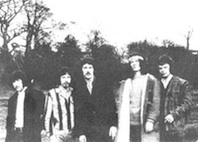
The band was in transition, with Rod Price (Foghat) on guitar. It was a fun quick project, and I was still learning about sound . . . much credit to producer David Hitchcock, who must have known I was a novice 19-yr old who was eager to learn. The piano came about simply because they decided that track needed some piano, and after trying out everyone in the band I boldly volunteered and went out and played one take on the already miked piano. I was not present at the re-mix, and the next thing I knew there I was on the record; they even faded out the rest of the band for an awkward stumbling moment . . . . I’m very proud to have had the credit: ” Superb bad-rock piano . . .” There is also a track called “Sylvester’s Blues”, which was not about me, but about a certain close female relative. My lips are sealed.
Shadowplays: David Hitchcock produced this album as well as many of the progressive groups of the time; such as Caravan, Camel and Genesis. (I think he became an accountant years later.) I admit to a soft spot for those old prog days. You were involved with a few of the Caravan releases as well? That whole Cantebury scene was a melting pot of fantastic progressive rock and jazz bands. Caravan, Soft Machine, Camel, Hatfield and the North, National Health: just some incredibly gifted musicians in a small area in Kent. Some great keyboard players: Dave Sinclair, Dave Stewart, Peter Bardens, did you ever work with Peter Bardens? I still listen to some of his stuff with Peter Green. Late 60’s early 70’s was such an incredible, diverse time musically. You also worked in the studio with East of Eden? with David Arbus on violin? He did the solo in The Who’s Baba O’Riley.
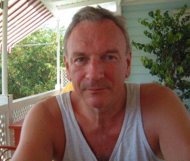
Robin Sylvester: East Of Eden was the first session I did with David Hitchcock. Very early on they came in to try the studio, and made some great demos. They came back to make the whole album, and with David’s guidance got a very reasonable sound. This was followed quite swiftly by Black Cat Bones and Caravan, with whom I formed quite a tight personal relationship for a couple of years. Lots of fun experimental stuff, all squeezed onto 8-track. Peter Bardens brought Marsupilami in, and did a few things of his own. There were SO many sessions in those days – I would frequently sleep under the piano! – a lot of jazz (John Surman), blues (Champion Jack Dupree, Aynsley Dunbar Retaliation) and a ton of hopeful writers (Richard O’Brien with bits of Rocky Horror material!!). The Move came in one day (as a 3-piece) and bashed out “Hello Suzie”. I was barely 19 and loving every minute!
Forgive me, but I would like to take this opportunity to thank David Hitchcock for lifting me out of the gutter one night when I was most embarrassingly incapacitated after a christmas party. My girlfriend had wisely abandoned me; but David bribed a taxi driver to take me home and everyone made fun of me for weeks. Doesn’t seem so funny now. Anyhow, I never had the chance to thank him: thanks David.
Shadowplays: You got to work with some great artists, but (at least for this writer) your greatest collaboration at Tangerine Studio was working with Irish legend, Rory Gallagher. Here is what Rory said about you in an interview in the mid-70″s. Sounds like with you at the boards, Rory didn’t need a producer!
I was working with a great engineer Robin Sylvester and he’s A-one. I’ve worked with him before and he’s caught us at gigs so I can leave a lot on his shoulders. — Rory Gallagher
Robin Sylvester: A-one! That’s a Rory turn of phrase all right! I can hear his gentle brogue saying that! Well, thanks for the confidence. I was a huge personal fan, so I gave his sessions my best. If he wanted to sing live in that tiny room with a loud band . .breaking every rule I had learned . . . then I would find a way to do it.
Shadowplays: Rory’s brother, Donal, has said that they first met you through your connection with Byzantium. Do you remember those times? I know they opened a few times for him at Sheffield Music Hall. Do you remember your first conversation with Rory?
Robin Sylvester: There was a management/agent connection. Someone probably said Rory would love this funky studio, and he came to try it out. I first met him in the studio; but it was very relaxed – just the 3 of them plus Donal. We hung out together on the break and talked about blues artists and the kind of sound he was after. He had more extensive knowledge of the blues than anybody else I’d ever met, and from the sound of it he had all those hard-to-find records, too!
Shadowplays: A very extensive knowledge of the blues. Watching old interviews of Rory is almost as enjoyable as watching him play. He was so knowledgeable about music, in particular about the Blues, and he spoke so articulately. How many albums did you engineer for Rory? And what was your favorite?
Robin Sylvester: Deuce, Live In Europe, Irish Tour 74, and Against The Grain were pretty much all my own work – I didn’t even rate an assistant at Tangerine! – I helped with the mixes on Tattoo, and there was other stuff that never saw the light of day back then.
Shadowplays: Let’s start with the first of these albums, Deuce. Johnny Marr called Deuce a major influence on his guitar playing:
I spent a day just playing along with the album. It was a complete turning point for me.” — Johnny Marr
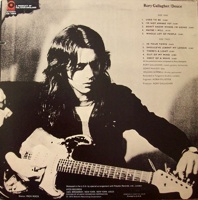
So Rory came into Tangerine Studios to have a look around, recorded a few tracks, then hired you guys to record his second solo album, Deuce? What do you remember about working on the project? The liner notes state that Rory was trying to “capture the raw feel of a live performance” and many of the sessions were recorded directly after or before gigs. That must have been exhausting going directly from a gig to recording. He was such a workaholic. And his approach to recording was a bare bones minimalist philosophy — hit “record” and see what we’ve got? Any favorites tunes from those sessions? I thought Crest of a Wave was a great way to end that album.
Robin Sylvester: That’s basically the story. I remember after the try-out I made some rough mixes, trying to impress him with wild Hendrix-y effects . . he must have HATED it! But he came back and politely steered me to the rough-edged sound he was after. He always wanted more bass on the guitar, liked to feel the room moving sympathetically. It was always sweaty in Tangerine, no matter the weather – and unbearable on summer days. Didn’t bother Rory! We would work in sensible time parcels, with decent breaks and Chinese take-away or Fish & Chips, and the pub before closing time. We did schedule some stuff after shows, yes. I don’t remember specifics. I was always amazed that Rory could rip off an overdub passage early in the morning with as much feeling as late at night. Actually the whole project was very quick. We mastered at Apple, by the way . . .it was always a thrill when they were still at Saville Row, just being in that Apple building!
Shadowplays: Did you ever meet the Beatles, or see any of their shows?
Robin Sylvester: Well, yes and no (however wiki-pedia has it!) I certainly saw them several times at the Finsbury Park Astoria, and their Christmas show at Hammersmith Odeon. Can’t say I really HEARD them, though, – the screaming was unreal. Never met any of them in any significant way . . . I saw John in an antique store in Weybridge in the summer of ’67, along with the painted Rolls-Royce, which was quite a thrill. Also saw him strolling down Amsterdam Avenue with Yoko in ’76, which somehow felt very normal! Ringo turned up at a Wardour St drinking club one day, but didn’t stay long. That’s about it. I learned bass from listening to Paul, and I was mixing at Abbey Rd one day when the Beatles were in the middle of making the AR album, – but they were not present that day. I was shown the studio. There was a note on the board not to touch anything because Paul would be coming in early to complete some vocals. I was, of course, quite a novice then, trying to remember everything, like the linen dish-cloths used to damp the drums; but mostly I remember the bed for Yoko, the toaster, the hang-out area behind the huge screens.
Shadowplays: For our interview you’ve gone back and had another listen to the albums you engineered for Rory. What was your impressions of Deuce, after so many years?
Robin Sylvester: I first put on my original Polydor UK album. In pretty good condition for 40 years of frequent playing! A little surface noise, but I can hear everything we did quite clearly. I’m very fond of it, as of one’s first-born, and I could never pick a favorite track. Every tune evokes a dozen memories, at least half of them technical. The drum sound is . . .very old-school. If we used 3 tracks for them it was a rare extravagance! No digital effects of any kind, of course, even in our dreams. We used no DI (direct feed) on the bass. Why not? Because we didn’t have one!
Most of Rory’s guitars were played live, along with the vocals. Some rhythm parts were doubled and added under the solos. I’d forgotten about the 12-string . . . And what a great harmonica player, too! All the slide parts and the open-tune rhythm-parts were played on the Telecaster; the rest on the Strat. This was still the Vox AC-30 with Treble-Booster period. Nothing else!
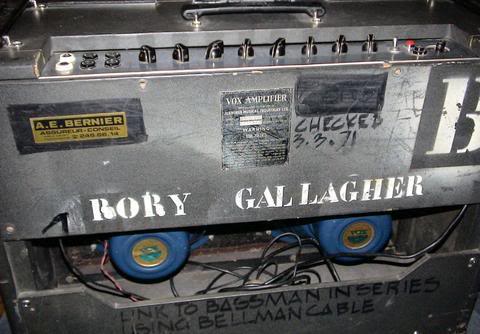
At one point he also got a nice old tan Fender Twin – which burst into flames on stage one night.
I also have a l979 Chrysalis (U.S.) copy: no surface noise! But definitely from a second generation tape. For example, the slide on “In Your Town” just screams on the original.
I notice on some tunes we used a touch of what I used to call “John Lennon” tape-delay on the vocal. (A fast-speed single delay from the playback head of the spare 2-track. At slower speeds this was the “Elvis” echo!) This helped the guitar sound open up too: Tangerine was small and boxy and needed a little help! The odd drastic panning effects were another product of the board’s restrictions. Believe it or not, it had no pan-pots! Four selected channels could be switched to a half-right or half-left position, and changes during a mix had an unpredictable effect on the level!
Shadowplays: I never thought about there being a difference in the sound between the UK release and American release of the same album. I might have to expand my collection. Thank heavens for ebay!
End of Part Two
This ends Part Two of my interview with Robin Sylvester. In Part Three, Robin talks about working with Rory on two of his live albums: Live in Europe, and Irish Tour ’74
One Response to “Rory Days: An interview with Robin Sylvester — Part 2”
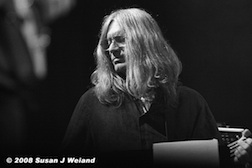
[…] remarks on Rory’s legacy. You can read the previous parts of the interview here: Part 1 | Part 2 | Part 3 | Part […]